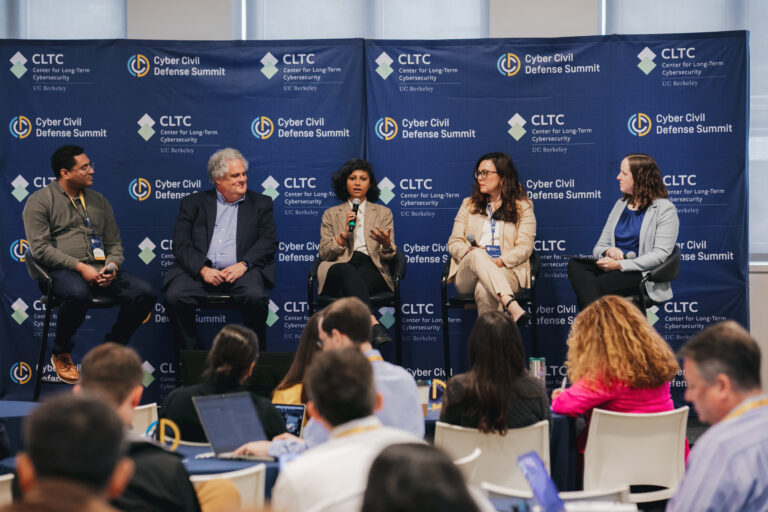Addressing Tomorrow’s Security Challenges
Our researchers are tackling important questions that will shape the future of cybersecurity.
Explore all Programs & Initiatives
-

AI Security Initiative
Advancing AI Risk Management in the Public Interest
-

Public Interest Cybersecurity
Helping all communities that rely on technology for public life receive cybersecurity protection
-

Consortium of Cybersecurity Clinics
Cybersecurity for the Public Good For decades, students at schools of law and medicine…
-

UC Berkeley Cybersecurity Clinic
Advancing digital security and privacy for the social sector
-

Cyber Civil Defense Summit
About The Cyber Civil Defense Summit is a one-of-a-kind gathering of cyber defenders, academics,…
-

Cyber Resilience Corps
Mobilizing cyber volunteers nationwide to defend the organizations that power our communities.
-

CyberCAN: Cybersecurity for Cities and Nonprofits
An urgent need Nonprofits like food banks, homelessness services, and community development organizations provide…
-

AI-Enabled Cybercrime
Leading the Fight Against Tomorrow’s Threats Artificial Intelligence is transforming the world. It’s helping…
-

Cybersecurity Futures
The need for long-term strategic foresight in cybersecurity has never been greater
-

Data Practices, Policy, and Privacy at Scale
Helping leaders develop forward-thinking practices and policies for managing data at scale
-

Board Governance of Cybersecurity Risk
How can boards play a more strategic role in cybersecurity governance and oversight?
-

AI Policy Hub
Advancing interdisciplinary research to anticipate and address AI policy opportunities
Upcoming Events

To be prescient is powerful
The Center for Long-Term Cybersecurity actively seeks partners with whom to build and expand our future-focused research agenda.
Cutting-Edge Research
Our community of students and alumni represent the next generation of leaders in industry, public interest, and cybersecurity research.
Featured

The Roadmap to Community Cyber Defense: A Path Forward from the Cyber Resilience Corps
Developing Tomorrow’s Leaders
The Master of Information and Cybersecurity Delivered Online from UC Berkeley
The UC Berkeley School of Information’s Master of Information
and Cybersecurity (MICS) program prepares students with advanced
technical and managerial skills needed to combat cyber attacks and
become influential leaders in cybersecurity.
Delivered on an interactive, online platform and designed by UC Berkeley
I School faculty, the MICS program brings the unique UC Berkeley
experience to students — no matter where they live.

“We’re not going to train you to just be a professional on the day you graduate — we’re going to train you with the underlying technology and knowledge so that you’ll be able to upgrade your skills over time and stay effective in the [job] market.”
Steven Weber, Professor






